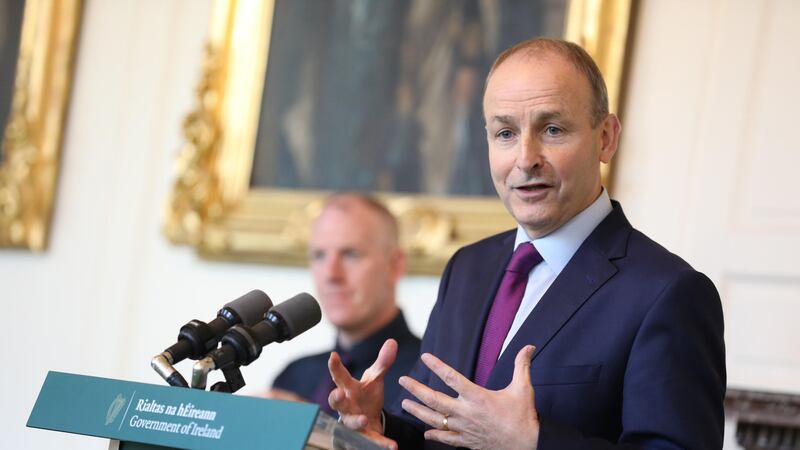My octogenarian father has a vivid memory, as a child, of my grandfather rushing into the house to ‘switch on Athlone’ (as he insisted on calling Radio Eireann) to hear an important message from the taoiseach, only to be bitterly disappointed when he realised that the north did not feature prominently in De Valera’s pronouncement.
This did not prove to be a unique experience.
Since partition, successive Irish governments have singularly failed to take ownership of the campaign to reunify the country, provoking disappointment and resentment amongst the northern nationalist community and republicans across the island impatient to end the nationalist nightmare and right the wrongs of partition.
Last Thursday, An Taoiseach Micheál Martin made a speech launching his Shared Island initiative. He chose Dublin Castle specifically because of its historical significance and used the occasion to announce that the venue would be the operational headquarters for the new unit.
Be under no illusion: this step is a reaction to the electoral success and associated political influence now being exerted by Sinn Féin within southern Irish politics. It would not have happened had Mary Lou McDonald not succeeded in leading the republican party to break the traditional Fianna Fáil-Fine Gael duopoly and force the rivals into sharing power.
That was a transformative moment in Irish history continuing to impact on politics, north and south. Within a few months of that election, a Fianna Fáil taoiseach has been forced into creating a unit with a half billion Euro budget to finally begin putting flesh on the bones of all-Ireland policy development, something no Irish government had either felt compelled nor inclined to do up to that point in history.
The messaging employed by the Fianna Fáil leader has been intentionally provocative at times to distance the initiative from Sinn Féin and to suggest that it constituted a rejection of the united Ireland campaign most readily associated with the party. He was at it again last week when referencing “Brits out” as a strategy even though those sentiments could not reasonably be ascribed to any pro-unity vision being articulated at this time or over the past few decades.
In his desire to shape a new space for his proposals to be received and considered by unionists, the taoiseach has publicly spoken out against a border poll in a very dismissive and at times careless tone. As a consequence, he has rightly been rebuked by those aware of the fact that any suggestion of the Good Friday Agreement being undermined by a lack of clarity over the consent principle would be very dangerous, empowering those within unionism who would invariably seek to resist by any means a democratic transition to unity at some point in the future.
In recent years, it has become the fashion in some quarters to speak of a shared and agreed Ireland instead of a united country. By labelling his initiative a ‘shared island’ unit, the taoiseach was going a step further and hinting that his endeavours were motivated by a desire to promote sharing without unity implications - akin to a friends with benefits offer to heads not readily turned by the constitutional question.
Whilst that has understandably caused some rancour and discord amongst northern nationalists suspicious of the sincerity, motives and intentions of the taoiseach, it is nevertheless something that is worth indulging at this point - a case, if ever there was, of keeping one’s eyes firmly fixed on the prize.
Our political environment continues to be in a state of flux due to the enormous challenges presented by Brexit, Covid-19 and a rapidly transforming Ireland. Micheál Martin has pointed out that more than 1.3 million people living in Ireland today were born after the Good Friday Agreement. Dogmatic attitudes and approaches are counter-productive when the intention of shifting tones and terms is to open new doors and minds to the possibilities and realities of change.
The shared island approach is best understood as a pitch to moderate unionists and the burgeoning non-aligned community in the north to embrace the vision of all-Ireland engagement for pragmatic purposes in the knowledge that political unionism will continue to strive to frustrate any such progress regardless of how it’s framed. The absence of substantive north-south development through the devolved institutions at Stormont over the past two decades illustrates the difficulties to date in progressing this agenda in the absence of focused and determined direction from Dublin.
Whilst we have seen many false dawns in the past, the taoiseach deserves to be given the benefit of the doubt. The shared island unit has the potential to finally begin demonstrating the efficacy and benefits of thinking 32 to people across Ireland, something advocates for unity can only welcome.









